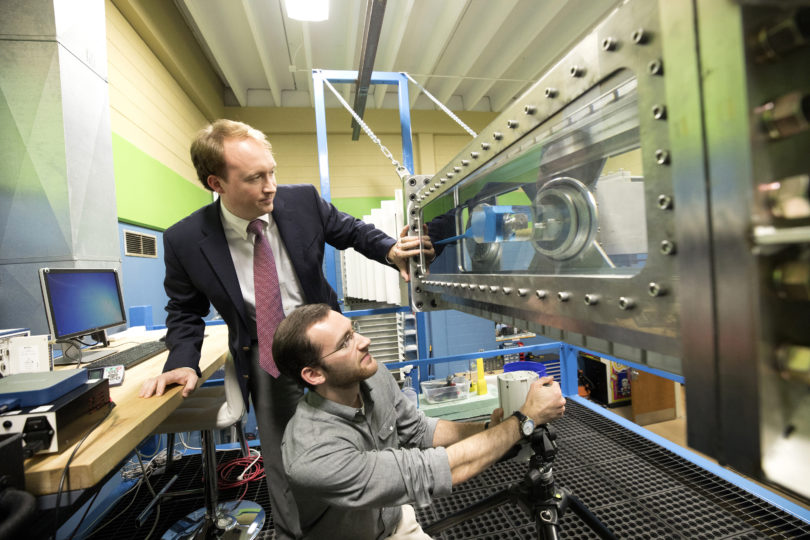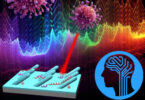Ben Davis, an assistant professor in the College of Engineering, conducts research that helps predict, and ultimately avoid, failures in aerospace and naval structures.
Where did you earn degrees and what are your current responsibilities at UGA?
I received my Bachelor of Science degree and Ph.D. from Duke University, both in mechanical engineering. In between those degrees, I earned a Master of Science degree in mechanical engineering from Georgia Tech. I had the unique experience of completing most of my master’s degree at Georgia Tech’s campus in France. I even took a few engineering courses that were taught entirely in French.
Like most faculty at UGA, I have a number of responsibilities in and out of the classroom. I teach undergraduate and graduate courses in mechanical engineering and supervise a research lab that currently has seven master’s and Ph.D. students, as well as several undergraduates. Our lab publishes journal and conference papers in our field and receives research funding from agencies such as NASA, the Department of Defense and the Department of Energy. I work closely with industry partners such as Gulfstream Aerospace on student design projects and also serve on a number of College of Engineering and university committees.
When did you come to UGA and what brought you here?
I started at UGA in the fall of 2014. I came here after working for six years as an engineer at the NASA Marshall Space Flight Center in Huntsville, Alabama. At NASA, I performed vibrations and acoustic analyses on liquid rocket engines and solid rocket motors.
People often ask why I left a great job at NASA to come to UGA. It was a difficult decision, but I felt that the opportunity to be involved with a new mechanical engineering program at a school like UGA was too unique to pass up. I also felt that a faculty position offers an unparalleled opportunity to challenge myself to grow as a teacher, researcher and mentor. Both of these motivations have proved to be prescient. In addition to being a part of the tremendous growth of the College of Engineering, my position affords me countless opportunities to do challenging work that stretches my abilities in all sorts of ways.
What are your favorite courses and why?
I really enjoy teaching “Mechanical Vibration.” It’s an upper-level elective for mechanical engineering undergraduates. It deals with the mathematical modeling of vibration phenomena. I love it because sometimes in the span of a single lecture, we can derive a mathematical model for a vibrating system, solve the model and then do an actual experiment that verifies the model’s predictions. I like creating mathematical models to predict the dynamic behavior of physical systems. To me, it is about as close as humans can get to being able to predict the future.
What are some highlights of your career at UGA?
One highlight is the installation of a high-speed water tunnel in my lab. A water tunnel is similar to a wind tunnel, but it circulates water instead of air. We use the water tunnel to measure and visualize the interaction between flexible structures and flowing fluid. Our water tunnel is an impressive machine. It is 35 feet long, nearly 20 feet tall and at top speed pushes more than 2,300 pounds of water through the test section every second. I believe it’s the only university-owned high-speed water tunnel in the Southeast, and it’s one of just a few nationwide.
Another highlight was being named a Lilly Teaching Fellow. Each year, this program selects a small cohort of junior faculty who are passionate about teaching and honing their instructional skills. I have loved getting to know faculty from other disciplines, learning about their individual areas of expertise and exploring new pedagogical techniques to engage our students.
How do you describe the scope and impact of your research or scholarship to people outside of your field?
I study the ways in which aerospace and naval structures dynamically interact with their environment. For instance, I recently studied how rocket fairings vibrate in response to the sound generated at lift-off. I am especially interested in situations in which a structure’s interaction with its environment can lead to a sudden loss of stability. For example, aircraft wings are prone to a phenomenon known as flutter, where interactions between the wing and the surrounding aerodynamic forces destabilize the wing, sometimes causing the wing to break. As engineers strive to make lighter and more flexible air, space and sea vehicles, the advanced structures that make up these vehicles operate on the edge of stability, and it is essential for engineers to know how to predict, and ultimately avoid, structural failures due to instability.
How does your research or scholarship inspire your teaching, and vice versa?
The cliché about the teacher being the person who learns the most in the classroom is definitely true. Teaching forces me to understand the fundamentals underpinning my research on a level that would be impossible to attain otherwise. Even after teaching a course multiple times, I still come away with new insights and understanding.
I also find the classroom to be a great place to talk about research. If it is relevant, I will sometimes use my class as a sounding board for new research ideas or to practice a research presentation. I think the students like seeing how the fundamentals they are learning in class get used to solve new research problems.
What do you hope students gain from their classroom experience with you?
My favorite comment to receive from students is something like, “This class was difficult, but I learned a lot and really enjoyed it.” I strive to infuse my courses with rigor, but I want the rigor to be motivated by well-defined learning objectives. I also want my students to experience the satisfaction that comes from working hard toward a challenging and important goal, which parallels what they will experience when they enter the workforce.
Describe your ideal student.
I really enjoy working with students on research projects and am drawn to students who are intellectually fearless, as well as persistent and resourceful. Research is difficult and the outcomes are never certain, but I find that students who tackle a problem without fear of failure and with a can-do attitude are bound to be successful one way or another.
Favorite place to be/thing to do on campus is …
… in my office working on a tricky research problem. If I have a good cup of coffee on hand, then that is even better! When I need a break, I have a pleasant little walking loop that takes me past Stegman Coliseum, the tennis complex and Foley Field. If there happens to be a baseball game going on, I will usually stop to watch for an inning or two.
Beyond the UGA campus, I like to …
… spend time with my family. My wife and I are new parents to a 16-month-old son, Robby, and we take endless delight in watching him grow and discover the world. One of his very first words was “rocket,” which was very exciting for me. Most nights, we take Robby on a stroll around the neighborhood. It’s a nice way to unwind at the end of the day.
Community/civic involvement includes….
My wife is a pastor with the Presbyterian Student Center, so we have an active church life. I also recently led a service-learning project in which my students and I worked with a third-grade class at nearby Rocky Branch Elementary School to design and install sound absorbing panels in their noisy cafeteria. The project was a big success, and we had so much fun working with the third-graders.
Favorite book/movie (and why)?
I like the book “Sync: How Order Emerges from Chaos in the Universe, Nature and Daily Life” by Steven Strogatz. It deals with a natural tendency for animate and even some inanimate objects to spontaneously synchronize. Strogatz is an applied mathematician at Cornell, but the book is written for a general audience. The subject matter is fascinating to me, and I like the way that Strogatz weaves in his own personal history with the subject. It gives great insight into the life of a university scholar. I am currently using the book as the basis for a First-Year Odyssey Seminar on synchronization in nature and engineering.
The one UGA experience I will always remember will be …
… participating as a faculty member in my youngest sister’s graduation. My sister, Hannah, graduated in 2015 with a B.S. in biology, and I was on the field with her during Commencement. My family is originally from Maine, so getting to share that experience with her here at UGA seems as improbable as it was special.
Is there anything else you’d like to add?
Even though UGA is a big place, it feels small and familial to me. I love the school spirit and the friendliness that pervades campus. I also like the fact that even if I am far from Athens, as long as I am wearing my UGA gear, there’s a good chance that I’ll be exchanging a few “Go Dawgs!” with fellow fans.








